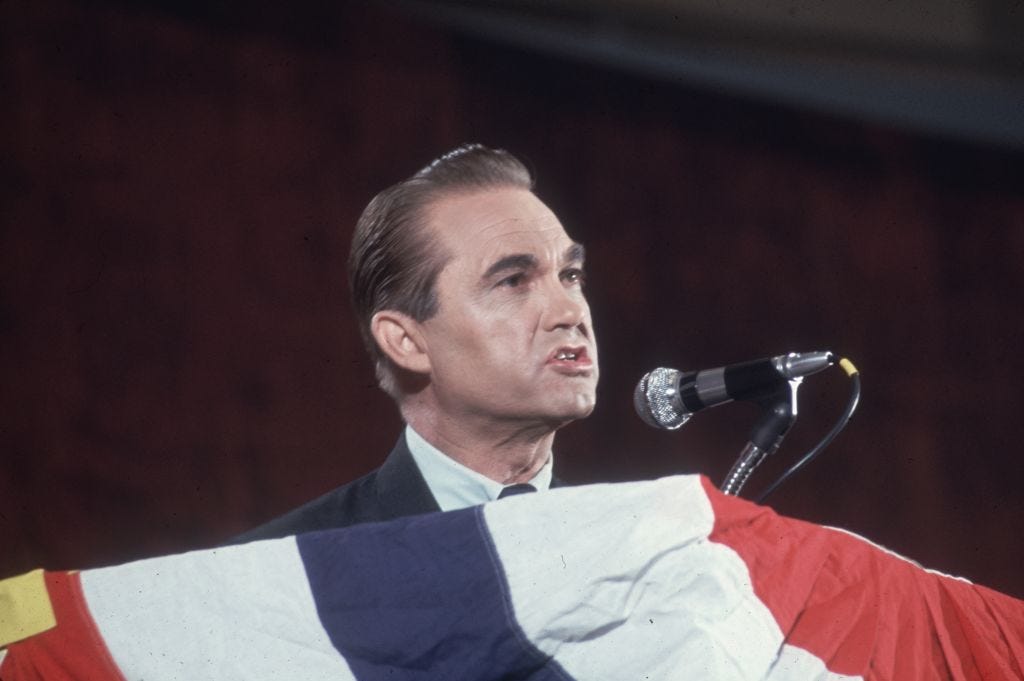Election Countdown, 205 Days to Go: Reality Closes In.
Keeping track of the people who are serious, and those who are still playing make-believe. Also, why we don't want presidential ‘debates.’
Third-party presidential candidates always say they want to “send a message.” This is the last person to have come close to doing so, 56 years ago: The segregationist former Alabama governor George C. Wallace, who in 1968 carried five Southern states and won 46 electoral votes on a white-resentment-driven platform. Unfortunately, the loudest and most lasting “message” he conveyed was that the national Republican party should embrace his outlook and shift its appeal to his base. (Getty Images.)
These past two weeks have been enormously consequential, in both real-world and electoral terms. Vintage-1864 abortion rulings in Arizona. The welcome implosion of ‘No Labels.’ Donald Trump’s first criminal trial, starting tomorrow. The deaths in Gaza of seven people from Jose Andres’s World Central Kitchen, amid the deaths of countless others less renowned. The Israeli attack on an Iranian building in Damascus two weeks ago, and the Iranian counter-attack on Israel last night.1
The post is about how such events register on the timeline of choosing a next president, with less than seven months to go.
1) Presidential elections do not ‘send messages.’ They determine who is going to be in charge.
The history of American politics is of “messages” being conveyed in various ways: That slavery was wrong. That unions deserved a voice, and that women deserved a vote. That segregation was wrong. That wars had gone on too long. That rampant pollution must be stopped. That abortion (in some Americans’ view) was an absolute evil, or that abortion rights (in others’ view) were absolutely essential. These are a few of the messages transmitted through the complex, imperfect feedback system that is electoral democracy.
I mention this obvious point because of a less obvious consequence. Presidential elections do not ever have the effect of “sending a message.” Their unique purpose is to determine who will be in power:
-For the next four years, who will nominate people for the Supreme Court? Who will staff the next ranks of district judges and appeals-court judges in the federal judiciary? Who will represent the United States overseas? Who will make the judgment calls—about war and peace, about doing more and doing less, about this emphasis versus that—that make up the job of the presidency? Who will be the counterpart, in a good way, of John F. Kennedy during the Cuban Missile Crisis? Or the counterpart, in a bad way, of G.W. Bush in the rush to invading Iraq after the 9/11 attacks?
The ripple effects of which party holds power are clear during a president’s years in office, but they last much longer. The six-vote members of the GOP’s current Supreme Court super-majority were all nurtured as youngsters in previous GOP administrations. (Three of them—Roberts, Kavanaugh, Barrett—were members of the GW Bush legal team during the 2000 Florida-recount wars. If we saw this pattern in any other country…) Most members of Joe Biden’s cabinet were in previous positions during Bill Clinton’s or Barack Obama’s administrations. Holding power matters now, and it will matter later on.
That’s the choice, and the only choice, voters can influence every presidential-election day.
On the other 1460 days of a four-year cycle, they—we—can “send messages.” We can do so by: Voting in primaries. Making donations. Withholding donations. Organizing. Protesting. Petitioning. Running for office. Switching support. Turning against an ally who is not supportive enough. Turning toward an ally who is. Generally being a burr under the saddle. This is how civic society works. And what it is over-represented in polls that are months or years ahead of election day. (That is, people complaining about an incumbent who isn’t fully in line with their movement’s goals, even though in the end they will probably vote for him or her.)
But for presidential elections, “messages” don’t matter. Putting people in power does. Barring the unforeseeable, this fall Joe Biden will get another term—or Donald Trump will. Those are the options. You can moralize and criticize and protest on all the other 1460 days. But on November 5, by the structural logic of American politics, voters will make an either/or choice. If you don’t vote for one, you are effectively voting for the other. Thinking anything else is a fantasy.2
So why does this matter?
2) People who face this reality, and people who don’t.
The timeless fantasy of a third party, illustrated. I would like to say this is a scene from RFK Jr. headquarters, but it’s just a stock photo from Getty Images.
-As I’ve argued before, the secretly funded and cynically minded ‘No Labels’ was a distraction from electoral reality. It is good that they have now shut down.
-RFK Jr. has had the embarrassment of a (now dismissed) staff strategist caught on tape saying that the main goal was to hurt Biden, and the deeper embarrassment of choosing as a running mate someone who has zero public-affairs experience but has given $4 million to his campaign. That’s the way to clean up politics! (On this news Donald Trump must have thought: You can do that? How much could Kristi Noem pony up? Or Tim Scott? Or Stefanik?) RFK Jr. could still do damage, but he seems on the way down.
Who, by contrast, is facing the binary reality of a presidential election?
-I give you Liz Cheney—with whom I disagree on most points of foreign and domestic policy (as I did with her father). She has used her family name and her personal standing to say that she will do whatever it takes to keep Donald Trump from office—specifically including re-electing Joe Biden. As she put it, in laying out her disagreements with Biden: “Our nation can survive and recover from policy mistakes. We cannot recover from a president willing to torch the Constitution.”
She also took the step that today’s GOP cowards in Congress have feared: being willing to offend “the base” and lose her political seat. If the party were different, she could be its future.
-I give you too, David Hume Kennerly—who came to prominence as a White House photographer in the Watergate era, and who last week resigned from a Republican organization in order to support the independence of Liz Cheney. Kennerly had long been on the board for the Gerald Ford foundation. But he resigned after their denying an award to Liz Cheney—for fear of retaliation from Donald Trump. Here is a sample of Kennerly’s take-no-prisoners resignation letter:
After this current divisive era passes, people will remember who stood up for what…. I can’t in good conscience stay on the board of an organization representing Gerald R. Ford that doesn’t manifest his kind of guts. It’s now a place whose leadership is cowed by a demagogue creating and promulgating the greatest crisis our country has faced since the Civil War.
Today I am resigning from the Gerald R. Ford board as a trustee. If the foundation that bears the name of Gerald R. Ford won’t stand up to this real threat to our democracy, who will?
-I give you as well the impressive array of retired four-star generals and admirals, and former service secretaries from the Pentagon, weighing in about the dangers of Trump in office.
By inglorious contrast, here are two people who still won’t face electoral reality: John Lehman, and John Bolton.
-Lehman, who had been Navy Secretary under Ronald Reagan, wrote an impassioned column in the WSJ arguing that Donald Trump was the antithesis of everything Ronald Reagan stood for—and by extension, of everything good about America. The headline on this piece was “Reagan Would Never Vote for Trump.”
But Lehman ended his piece with the limp send-off that “since Mr. Biden has turned his platform over to socialist Bernie Sanders,” Lehman could not vote for him. I could put this more profanely, but: “Socialist” platform? Give me a break.
-As for Bolton, a former National Security Advisor under Donald Trump, in a recent interview with George Conway he recited all the reasons Donald Trump was dramatically and categorically “unfit” for office. But when asked by an audience member whether he would therefore vote for Biden, Bolton spinelessly (if directly) said:
The answer is No… I’m not going to vote for Joe Biden, who is not fit to be president any more than, for different reasons, than Donald Trump is… He has conceded to the left wing of the Democratic party things that are extraordinarily detrimental to the country. [His main example was forgiving student loans.]
Both Lehman and Bolton pride themselves as “realists” about international policy. They are not realistic about the United States. Not voting for Biden is voting for Trump.
Liz Cheney will look better for the choice she is making. These men, and their many colleagues,3 already look worse.
3) ‘Watch what we do, not what we say.’
(Note about the subhead: That is what Richard Nixon’s attorney general, John Mitchell, famously said back in the Watergate era.)





